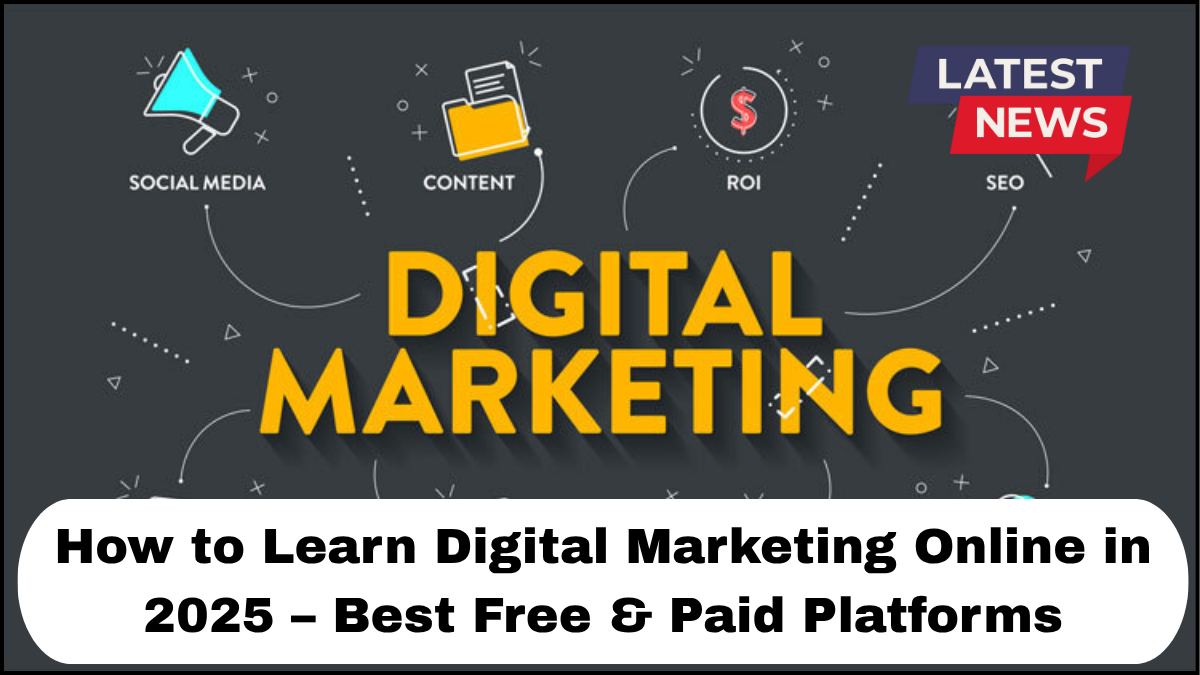In 2025, the digital marketing landscape demands up-to-the-minute skills and strategic thinking. Whether you want to pivot your career or boost your business, learning digital marketing online is an effective, efficient route. Below, discover how to learn digital marketing online using both free & paid course options that offer the latest tools, real-world case studies, and structured curricula.

H3: Why Learn Digital Marketing Online in 2025?
-
Fast‑paced innovations: AI-driven ad platforms, voice search SEO, and data privacy changes mean you need current, flexible learning.
-
Global accessibility: From New Delhi to New York, you can access cutting‑edge training without geographic constraints.
-
Affordability and flexibility: Online education lets you study at your own pace and budget—whether using free resources or paid certificates.
H3: Top Free Platforms for Learning Digital Marketing Online
1. Google Digital Garage
Offers a free foundational certification with modules on search, analytics, content marketing, and more. The curriculum updates periodically to reflect new trends—making it one of the most reliable free sources to learn digital marketing online.
2. HubSpot Academy
Features free mini‑courses on inbound marketing, email campaigns, social media, SEO, and content creation. Each course includes downloadable guides and practical challenges to reinforce learning.
3. Meta Blueprint (Facebook and Instagram Ads)
Provides no-cost lessons on running ads, budgeting, analytics, and creative strategy. The interface replicates real advertiser tools, offering hands-on experience for beginners.
4. Coursera & edX Audit Options
While full certificates cost money, auditing courses from top universities (e.g., University of Illinois, Wharton) gives access to lecture videos, readings, and peer discussion—making it a free entry point into structured coursework.
H3: Best Paid Course Platforms & Certifications
1. Coursera Specializations & Professional Certificates
Paid tracks—such as Coursera’s Digital Marketing Specialization—offer sequential modules on strategy, branding, SEO, paid advertising, and analytics. Projects and peer feedback reinforce skills. Financial aid may be available.
2. Udemy Comprehensive Courses
Instructors like Ashish Basu or Rob Percival offer up‑to‑date, in‑depth courses on SEO, Google Ads, social media, and more. One-time purchases often come with lifetime access and frequent sales.
3. LinkedIn Learning
Its subscription includes full digital marketing paths—covering strategy, digital analytics, content marketing, and more. LinkedIn Learning often integrates with your LinkedIn profile, highlighting completed modules for hiring managers.
4. SEMrush Academy & Moz Academy
For those focusing on SEO, SEMrush’s and Moz’s paid plans unlock advanced tutorials, certifications, and case studies using their tools—ideal for building in‑depth SEO and competitive research expertise.
5. Simplilearn / UpGrad / edX Paid Tracks
In India and globally, platforms like Simplilearn & UpGrad offer paid programs with mentorship, capstone projects, and career support—helpful if you want structured guidance and recognized certification.
H3: Comparing Free vs Paid Course Options
| Feature | Free Platforms | Paid Platforms & Certifications |
|---|---|---|
| Cost | $0 | Varies: $50 to $1,000+ |
| Certification | Basic, sometimes unaccredited | Accredited or widely recognized |
| Depth | Introductory or intermediate | Deep dives with hands‑on projects |
| Career Support | Self‑driven | Mentorship, capstone, resume/job assistance |
| Access Duration | Permanent but may expire | Lifetime or fixed course period |
Choose free options to build a foundation and proficiency. Then invest in paid courses when you’re ready for certification, projects, and career-oriented support.
H3: How to Maximize Your Learning Experience
• Set a learning plan
Begin with foundational free courses—complete modules week by week. Once comfortable, enroll in a paid specialization or certification to deepen expertise.
• Practice with real campaigns
Use Google Ads (start small budget) and run social media campaigns on platforms like Instagram, Facebook, or LinkedIn. Apply analytics tools and iteratively improve your performance based on data.
• Join communities & forums
Platforms like Reddit r/digital_marketing, GrowthHackers, and LinkedIn groups offer peer feedback, job leads, and case studies from practitioners.
• Stay current with blogs & newsletters
Follow resources such as Search Engine Journal, Neil Patel, HubSpot blog to keep up with Google algorithm updates, AI content tools, and privacy policy shifts.
• Create a portfolio
Document results: landing page A/B tests, ad dashboard screenshots, traffic growth from SEO and analytics reports. A live portfolio proves your capability to future employers or clients.
H3: Suggested Learning Path (Sample)
-
Start: Complete a free Google Digital Garage certificate and HubSpot Academy courses.
-
Build: Audit a university digital marketing course on Coursera or edX to understand theory.
-
Deepen: Buy a curated Udemy course or LinkedIn Learning path on SEO, PPC, and analytics.
-
Certify: Take paid tracks such as Coursera’s specialization or SEMrush/Moz advanced certification.
-
Apply: Run test projects: set up Google Ads, build a content calendar, optimize SEM keywords, track conversions.
-
Share: Showcase your results in a portfolio; engage in digital marketing communities for visibility and networking.
H3: FAQ
Q: Is it worth taking paid courses if I’ve already completed free ones?
Yes—paid options typically delve deeper, include mentor support, culminate in recognized certifications, and offer real-world assignments that free courses lack.
Q: Can I learn digital marketing online without any budget?
Absolutely—you can acquire foundation-level skills entirely via Google Digital Garage, HubSpot Academy, Meta Blueprint, and auditing free courses on platforms like Coursera or edX.
Q: How long does it take to learn digital marketing online, end to end?
If you study consistently (5–10 hours per week), you can reach a proficient working level in 3 to 6 months, even taking time for hands-on projects and certification.
Q: Do free courses include real-world case studies?
Some free platforms offer examples and use cases, but in-depth, hands-on simulations are more common in paid tracks.
Q: What comes next after learning digital marketing online?
After gaining knowledge and hands-on experience, build a portfolio and network in communities. Then apply for internships, freelance gigs, or in-house roles to further solidify your skills.
click here to learn more